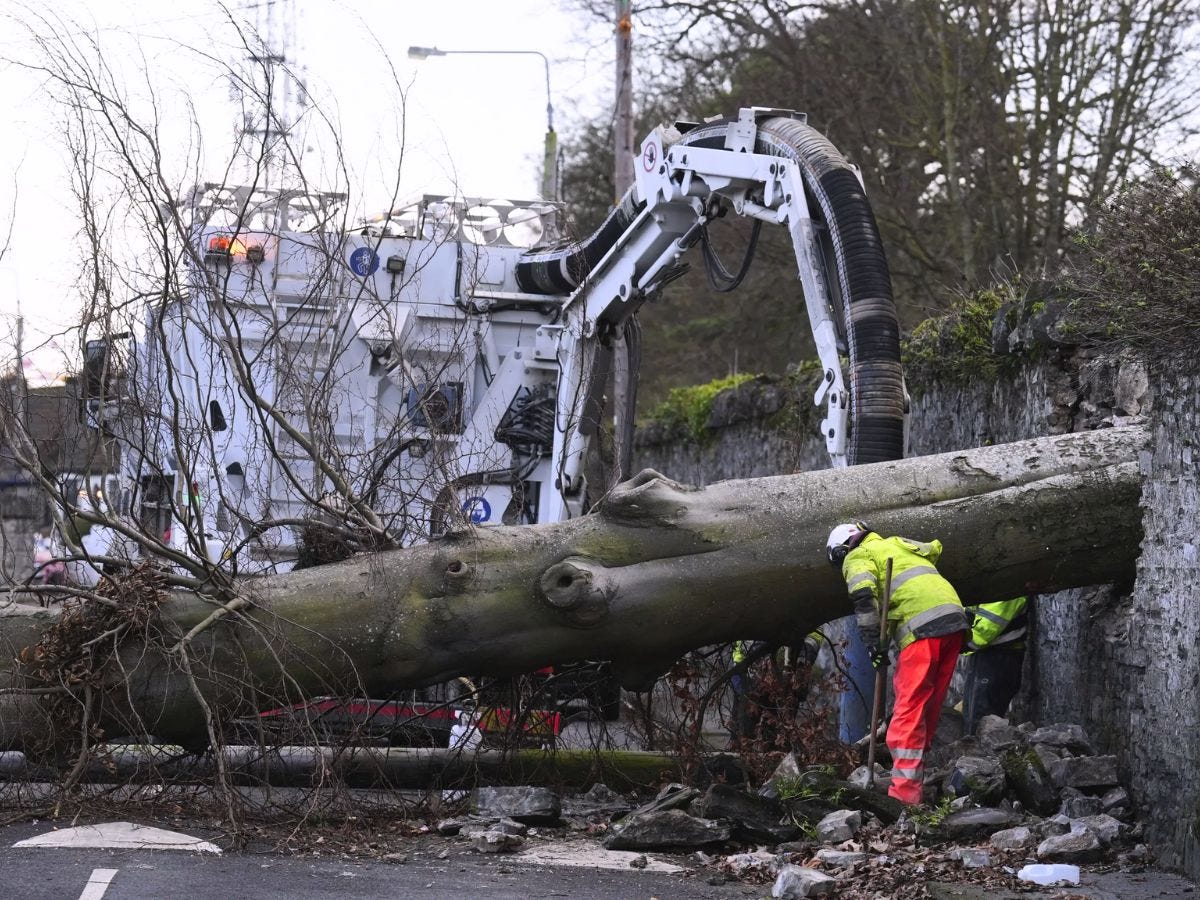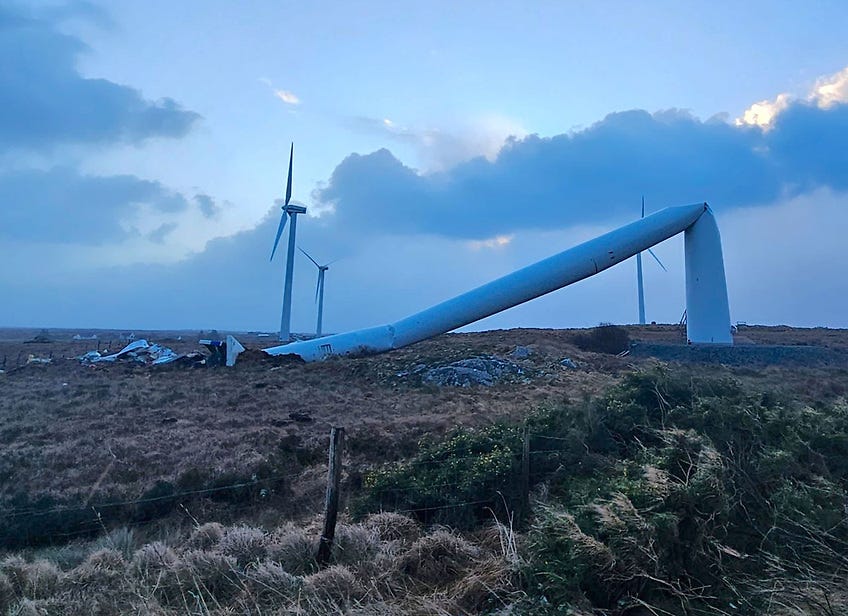The storm that shattered Ireland’s energy security
Storm Éowyn exposed the harsh reality of Ireland’s climate initiatives: unaffordable, ineffective, and unsustainable.
One of the most powerful weather events in Ireland’s history plunged the country into chaos last week. Bet you didn’t hear much about it, either, as it was hardly mentioned in the North American press. Still, the implications of its aftermath and what it reveals about the ‘green’ movement are a warning for any nation still gripped by obviously flawed climate ideology.
Storm Éowyn wreaked havoc across Ireland, with winds of over 100 mph downing power lines, flooding roads, and damaging renewable energy infrastructure. Hundreds of thousands of people were left without electricity for days in freezing winter conditions. Many people — up to 168,000 — are still without heat or light as of this writing, exposing the nation’s alarming dependence on electricity to meet basic needs.
More poignantly, the storm laid bare the vulnerabilities of renewable energy infrastructure. Thousands of wind turbines in the North Sea were forced offline because the power generated by the storm’s extreme winds risked overwhelming the electricity grid. "Constraint payments" were made to wind farm operators, compensating them for halting production — a cost ultimately passed on to consumers. This system, which guarantees profits for renewable energy companies regardless of output, highlights the flawed economic model underpinning Europe’s green energy push.
This inefficiency underscores a glaring and paradoxical tension: current energy generation systems being pushed under the banner of climate change are far from ready to meet the demands of extreme weather events, which climate activists frequently remind us are expected to increase.
The unaffordable cost of “saving the climate”

Ireland’s government set an ambitious target to install 680,000 heat pumps by 2030, a central pillar of its Climate Action Plan. While heat pumps are marketed as a greener alternative to fossil fuel heating, they come with significant caveats. They rely entirely on electricity, meaning that when the power goes out, as it did during Storm Éowyn, they are rendered useless wall hangings.
The push for heat pumps also raises questions of affordability. For many households, the upfront cost of installation — ranging from €10,000 to €20,000 — is prohibitive, even with government subsidies. Retrofitting older homes to meet the efficiency requirements for heat pumps adds even more expense, making this “green solution” an unattainable luxury for many working-class families.
Many homeowners who have installed heat pumps, like Steve Mason of Lincolnshire in Great Britain, report that the systems are, contrary to the hype, vastly more expensive. After installing his in 2022, Mason said his annual electricity bill was roughly double the cost of his previous set-up, and he still had to burn wood to stay warm.
In Ireland, however, policies introduced in 2014 effectively banned open fires in newly constructed homes, and regulations now restrict the use of older stoves and fireplaces unless they meet stringent environmental standards. While these measures aim to reduce emissions, they have left many households without reliable backup heating options during power outages. In rural areas, where solid fuel stoves were once a lifeline, families now find themselves stranded in the cold, forced to rely on an unreliable and expensive energy grid.
Proponents of these policies argue that they are necessary to meet Ireland’s climate goals, but at what cost? The financial burden of these initiatives disproportionately affects lower- and middle-income households. While wealthier families may be able to afford the transition to renewable energy systems, the majority of citizens are being pushed into energy poverty, struggling to keep up with rising electricity bills and the cost of upgrading their homes to comply with ever-tightening regulations.
Ireland’s current approach to climate policy assumes that transitioning to renewables will provide a seamless and sustainable future. However, Storm Éowyn has shown that the reality is far more complex. Renewable energy systems like wind and solar are weather-dependent, and the infrastructure to manage them during extreme conditions is sorely lacking.
The push for zero-emission homes, including the ban on open fires and the promotion of heat pumps, leaves families vulnerable to prolonged outages. Policymakers have failed to account for the practical realities of living through severe weather events, focusing instead on hitting climate targets that seem increasingly out of reach and not at all in the best interests of its populace.
Ireland’s climate policies are a case study in the dangers of pursuing idealistic goals. Such policies showcase a blatant disconnect between bureaucratic, centralized, myopic thinking in the service of one supposedly altruistic goal, without consideration for historical energy norms which have sustained its population for generations. Worse, families are being asked to shoulder the financial burden of policies that deliver little in terms of resilience or reliability in the name of ‘saving the environment.’
This flawed thinking is common across many Western governments and while perhaps not explicitly anti-human, has the effect of preying on the most vulnerable — the rural, the poor, the sick, and the elderly, especially.
To move forward, Ireland must prioritize energy security and affordability alongside climate goals. This means investing in a more robust grid capable of handling extreme weather, allowing for diverse heating options that include reliable backup systems, and rethinking policies that disproportionately affect those who can least afford them. After all, as our friends over at Doomberg say: “Energy is life.”
Storm Éowyn laid bare the flaws in Ireland’s climate strategy. While the push for renewable energy and low-emission homes is framed as essential for combating climate change, the reality is that these initiatives are expensive, ineffective, and leave ordinary citizens vulnerable.
A sustainable future cannot be built on the backs of struggling families, nor can it ignore the practical challenges of living through an increasingly unpredictable climate. Ireland’s leaders need to take a hard look at the policies they are championing and ask themselves: are we truly saving the climate, or are we just making life harder for the people we claim to serve?




Heat pumps are beautiful technology. They just use simple physics to transfer heat from one place to another. The technology dates back to 1748 when William Cullen demonstrated it first.
There are three main problems:
Firstly, our electrical generation and transmission systems are completely outdated and poorly maintained.
The second problem is that the push for renewable energy has been subverted by the profiteers who have just sucked all the money out of the system without any real accountability or providing the goods.
The third problem is that the currently available renewable technologies are geared towards intermittent production when we need constant supplies to meet the current needs. Additionally, the environmental impact that they have which is worse in some ways over what they are supposed to replace. Wind and solar are great, as long as you only need them when they are available. To use them effectively, you need storage which is far behind in its availability and capacity.
Hydro power is great except for the limited lifetime of the facility because the reservoirs fill up with sediment, the distance from the production of the power to the use points, and the dependence on current weather patterns. It has its own environmental impacts as well.
The only viable alternative to fossil fuels we have at present to meet our current needs, let alone our future needs, is nuclear power.
Renewable energy is an admirable goal, but like many things mandated by government, the route between conception and implementation is generally lacking. We found this out in Texas a few years ago when our power grid was sorely lacking during an unexpected ice storm. Our grid was relying on solar and wind too heavily, and maintenance on the existing infrastructure was neglected (why update it when you’re trying to eliminate it?). The result was hundreds of thousands of citizens were left with no power & no heat. In my mostly rural area, 76 hours without services meant no water, no toilets, no electricity, no grocery stores, no gas, etc. The public outcry was immense after the fact, there were people who lost their lives and many, in my area, had major damage to pipes, well heads and livestock. We learned from this experience, and are now more prepared, both from a personal standpoint & from a grid standpoint. It’s a tough way to learn a lesson but hopefully, Ireland will see the light.